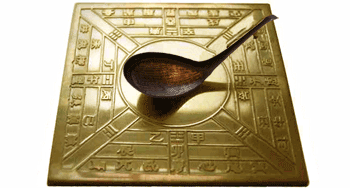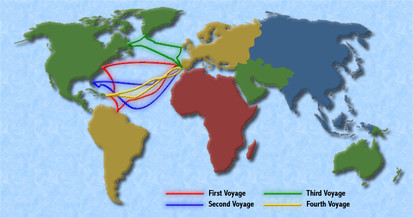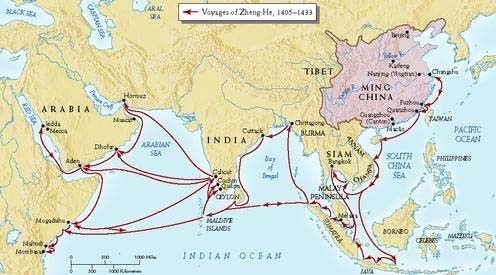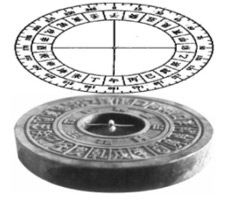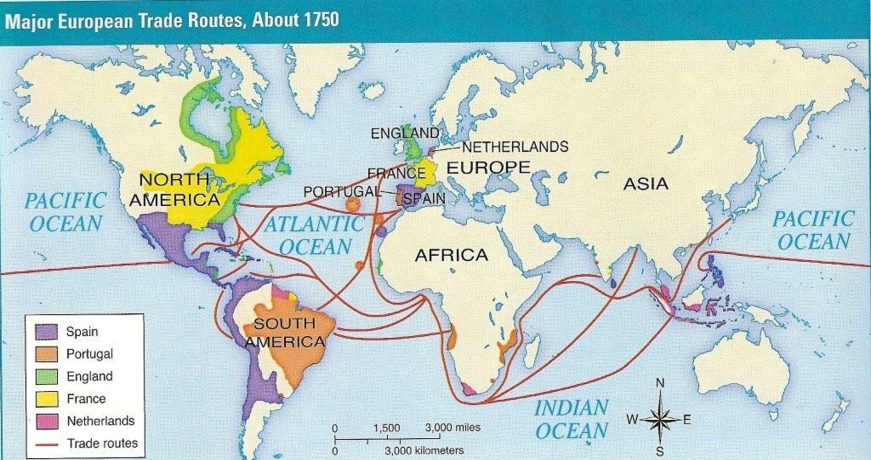Case Study: The Magnetic Compass
Tilly Behrmann & Srivi Vishnubhotla
Overview: The Compass and Trade
The compass, believed to possess Chinese origins, was a momentous innovation, contributing to the accessibility of navigation, and spurring notions for exploration, and ultimately, trade. Though the uses of the primitive Chinese compass were primarily ritualistic in origin (Chinese soothsayers found that rubbing a piece of steel against lodestone caused the steel to become magnetized and orientate itself in a North/South alignment), between the years of 850 C.E. and 1050 C.E., the magnetic compass could be seen aboard Chinese naval vessels, serving the purpose as a simple indicator of direction. Eventually, the Islamic Empire discovered the Chinese invention, and through European and Arab interaction throughout the Crusades, it is predicted that this tool was passed along to Christendom.
Throughout the Age of Exploration, the use of the compass was apparent on both Chinese and European ventures. For instance, Zheng He utilized the compass on his seven oceanic voyages between the years of 1405 and 1433 (after these years, the use of the magnetic compass in China largely diminished, as exploration and naval voyages were halted). The use of the compass could also be seen in European exploratory voyages, most notably, Columbus' expedition to the Americas. The resulting development was an era of colonization, marked by European economic growth, and the resulting concept of trade.
Throughout the Age of Exploration, the use of the compass was apparent on both Chinese and European ventures. For instance, Zheng He utilized the compass on his seven oceanic voyages between the years of 1405 and 1433 (after these years, the use of the magnetic compass in China largely diminished, as exploration and naval voyages were halted). The use of the compass could also be seen in European exploratory voyages, most notably, Columbus' expedition to the Americas. The resulting development was an era of colonization, marked by European economic growth, and the resulting concept of trade.
What's the Big Deal?
By comparing the Chinese use of the compass and the European use of the compass, an individual may notice two great differences: the purpose the compass served and whether or not the compass served a longstanding use in the region. In the case of China, the compass served expendable purposes, and was deemed obsolete, much like the concept of foreign exploration and trade. In Europe, on the other hand, the compass's served as an irreplaceable means of navigation, fueling the European economy. Unlike China, the purpose of the compass never became obsolete, as Europe continued to expand outward, in the name of conquest, curiosity, and necessity. Perhaps, this factor is what fueled Europe forward and held China back.
With this discovery, there exists a series of prominent continuities and changes that are apparent throughout time. As implied before, one main change is the role reversal of China and Europe. While China existed as the significant world power in medieval times, because of Europe's continued culture of exploration, trade, and will to grow economically, in contrast with China's eventual turn towards complacency and isolation, Europe ultimately overtook China as a world power.
Contrarily, through the use of the magnetic compass, the continuities of mankind's reliance upon technology, and the beneficial nature of trade are illustrated. The feats of trans-oceanic expedition would have been rendered impossible without the compass. Mankind could not have navigated such large bodies of water without the required sense of direction that the compass provided. And with this innovation came a great deal of exploration, and in the end, trade. By trading, Europe was allowed to garner resources and wealth, which the area was void of during the Dark Ages. This allowed Europe to expand its cultural influence and become the major world power it is today. Compare this to China's fate; after years of isolation, and the lack of trade that came as a result, economic growth and prosperity fell to stagnation.
With this discovery, there exists a series of prominent continuities and changes that are apparent throughout time. As implied before, one main change is the role reversal of China and Europe. While China existed as the significant world power in medieval times, because of Europe's continued culture of exploration, trade, and will to grow economically, in contrast with China's eventual turn towards complacency and isolation, Europe ultimately overtook China as a world power.
Contrarily, through the use of the magnetic compass, the continuities of mankind's reliance upon technology, and the beneficial nature of trade are illustrated. The feats of trans-oceanic expedition would have been rendered impossible without the compass. Mankind could not have navigated such large bodies of water without the required sense of direction that the compass provided. And with this innovation came a great deal of exploration, and in the end, trade. By trading, Europe was allowed to garner resources and wealth, which the area was void of during the Dark Ages. This allowed Europe to expand its cultural influence and become the major world power it is today. Compare this to China's fate; after years of isolation, and the lack of trade that came as a result, economic growth and prosperity fell to stagnation.
Citations
"China's Great Armada, Admiral Zheng He, Map - National Geographic Magazine." China's Great Armada, Admiral Zheng He, Map - National Geographic Magazine. National Geographic, Aug. 2005. Web. 08 Feb. 2013.
"Mariner's Compass - Wh 11 Sem1: Age of Exploration FGLN." Mariner's Compass - Wh 11 Sem1: Age of Exploration FGLN. N.p., n.d. Web. 08 Feb. 2013.
"Medieval Sourcebook: Christopher Columbus: Extracts from Journal." Internet History Sourcebooks Project. N.p., n.d. Web. 08 Feb. 2013.
"Welcome to the Columbus Day Site!" Columbus Day. N.p., 08 Feb. 2013. Web. 08 Feb. 2013.
"Zheng He Documents." Zheng He Documents. N.p., n.d. Web. 08 Feb. 2013.
"Zheng He's Sailing to West Ocean." Coordinates : A Resource on Positioning, Navigation and beyond » Blog Archive ». N.p., n.d. Web. 08 Feb. 2013.
"Mariner's Compass - Wh 11 Sem1: Age of Exploration FGLN." Mariner's Compass - Wh 11 Sem1: Age of Exploration FGLN. N.p., n.d. Web. 08 Feb. 2013.
"Medieval Sourcebook: Christopher Columbus: Extracts from Journal." Internet History Sourcebooks Project. N.p., n.d. Web. 08 Feb. 2013.
"Welcome to the Columbus Day Site!" Columbus Day. N.p., 08 Feb. 2013. Web. 08 Feb. 2013.
"Zheng He Documents." Zheng He Documents. N.p., n.d. Web. 08 Feb. 2013.
"Zheng He's Sailing to West Ocean." Coordinates : A Resource on Positioning, Navigation and beyond » Blog Archive ». N.p., n.d. Web. 08 Feb. 2013.
